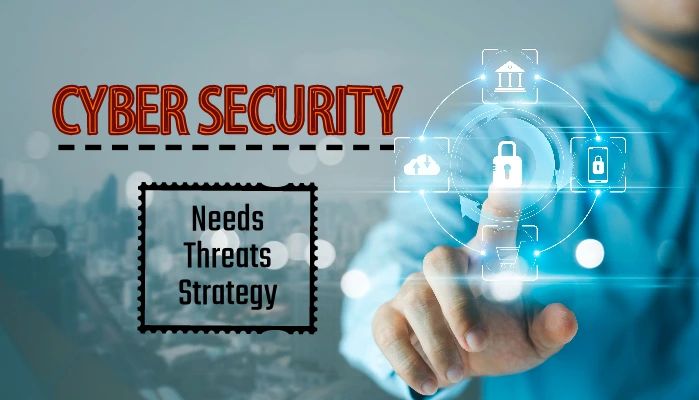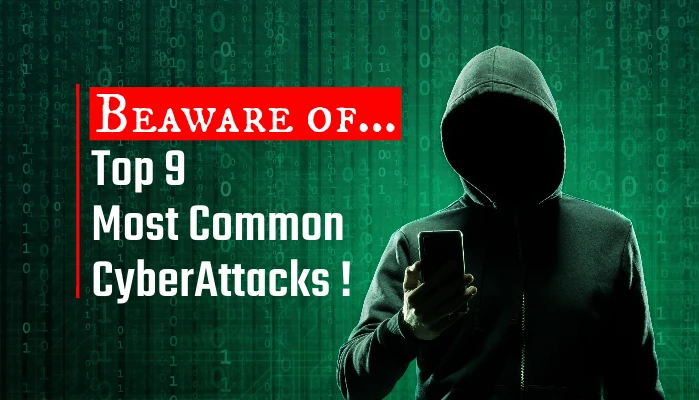Do you know even a minor error can give you a chance to the hackers, to exploit your systems? Most of the time, a home or business does not have an effective cyber security system in place. Hence, it becomes an easy target for hackers. Cyberattacks have the potential to disrupt, harm, or even destroy businesses. Moreover, the number of victims is rising with the use of the internet everywhere.
However, instead of seeing it as a problem, we must consider it a risk that needs proper management. It is possible by creating a set of standards and best practices. This blog will cover the various types of digital threats with some tips to secure systems and networks.
What is Cyber Security?
The term cybersecurity or IT security combines the tools, measures, or processes for preventing cyberattacks or reducing their effects. It works to defend against anything like minor and major computer viruses. Additionally, it also prevents complex and expensive ransomware attacks for both individual and company systems. So, it covers everything like apps, computing devices, sensitive data, and financial assets.
An effective cyber security strategy can offer good security against malicious assaults. Otherwise, hackers can gain access to, alter, delete, destroy, or extort sensitive data and systems of a business or user. Security measures help prevent attacks damaging a system or device’s functionality.
Cyber Security Fundamentals
Below are the main fundamentals of cyber protection or security:
- Ensure Online Connection Security
Information you share over the web needs extra security after logging in and connecting to the Internet. Virtual Private Networks (VPNs) are also helpful as they automatically encrypt internet traffic. Moreover, using VPN you can secure all online transactions including the user’s identity.
- Device Protection
Device protection should be a top priority for people and businesses looking for digital security. From laptops to AI-based devices, anything that connects to the internet is prone to cyber-attacks. Hence, it is crucial to secure them using anti-virus software and carry out a regular automatic system update. You can also enable the lock-and-erase options or activate two-factor authentication.
- Making timely backups of files and documents
Backups fall into two categories: cloud storage (online) and remote backups (offline). Remote backup services are economical and practical but are not always accessible. However, cloud solutions may be accessible from any location and are appropriate for a business with multiple sites.
However, anything that connects to the internet poses a risk of cyber threats. So, you must ensure that important papers have their own digital vault and encryption keys.
- Email Communication Security
Email is a common tool for cybercriminals to gather private information about people or businesses. Since encryption hides the actual data, it is a good idea to encrypt important emails. It also prevents sensitive information from being accessed by anybody other than the receiver. One-time password authentication is also effective in email encryption.
Importance and Need of Cyber Security
The importance of online security is increasing with more users, devices, and programs in the modern company. It can be explained in simple terms:
- Protection of Personal Information: It helps keep your personal information, like your name, address, and financial details, safe from hackers who might want to steal or misuse it.
- Preventing Financial Loss: Cybersecurity safeguards your money by protecting your online bank accounts and preventing unauthorized transactions.
- Online Safety: It ensures that you and your family can use the internet without fear, knowing that your devices and information are secure.
- Protecting Businesses: For companies, it is vital to protect sensitive business data, customer information, and operations. A breach can be costly and harm a company’s reputation.
- National Security: It protects critical infrastructure like power grids, communication systems, and defense networks from cyberattacks.
Top 10 Cyber Security Threats
Below are the major security risks globally to personal information and companies:
- Exposure to Third Parties
Cybercriminals may bypass security measures by breaking into less secure networks. Most of the time, these networks belong to third parties with special access to the hacker’s main target.
- Social Engineering
Social engineering is still one of the most dangerous hacking ways because it focuses more on human error than technical flaws. Moreover, Phishing is also the type of social engineering in which fake emails or texts arrive. These messages appear to be from reliable or well-known sources.
- Poor Configuration
Even security systems that professionals set up are likely to have at least one mistake.
- Cloud Vulnerabilities
Cloud vulnerabilities are increasing and web app breaches are to blame for most of the incidents.
- Inappropriate Cyber Hygiene
“Cyber hygiene” refers to usual routines and actions involving the use of technology. It can be avoiding open WiFi networks and using security measures like a VPN or multi-factor authentication.
- Mobile device Risks
An increase in mobile device use is also a risk factor. Many users depend more on smartphones and the use of touchless payment methods creates a cyber threat.
- Internet of Things
Many people bring their jobs into their homes, where households have at least one smart device. Thus, it leads to an increase in attacks against the “Internet of Things (IoT)” or smart devices.
- Ransomware
Besides the financial losses, ransomware attacks can harm businesses by preventing access to their systems and demanding payment.
- Improper data management
Maintaining order in your storage and organization systems is a key aspect of data management. Data becomes vulnerable to cyberattacks when there are piles of unnecessary data.
- Advanced persistent threats (APTs)
APIs focus on attacks that last a long time and involve an attacker entering a network. They are not detectable for a long time and collect crucial data.
By addressing these top threats and implementing best practices, you can significantly increase your website security. Now, take a quick look on how to be safe from these attacks.
How to Secure Yourself From Cyberattacks?
Below are our top cyber safety tips:
- Timely update your software and operating system.
- Make sure to create strong passwords that are not easily guessable.
- Use anti-virus software.
- Avoid clicking on links in emails from unknown senders or websites.
- Don’t use WiFi networks in public places to avoid man-in-the-middle attacks.
List of Biggest Cybersecurity Companies in World
Here’s a list of 10 prominent cyber security companies worldwide:
- Symantec (Now part of Norton LifeLock)
- McAfee (Now part of Norton LifeLock)
- Cisco
- Palo Alto Networks
- Check Point Software Technologies
- Fortinet
- Trend Micro
- CrowdStrike
- FireEye
- Proofpoint
Please keep in mind that the cybersecurity landscape is dynamic, with new companies emerging and mergers/acquisitions occurring. It’s important to check the latest industry reports and rankings for the most up-to-date information on the biggest cybersecurity companies in the world.
Also Read: What is transport layer security?
Conclusion
In conclusion, understanding the imperative need for cyber security, recognizing the evolving threats, and implementing effective strategies is paramount in safeguarding digital assets and maintaining a secure online environment. Cyber security is like locking your doors to keep your home safe, but for your digital world. So let’s stay safe out there!
Frequently Asked Questions
Q. Is cybersecurity good for freshers?
Ans. You can consider cybersecurity as a fresher. It is an in-demand field with lots of room for growth.
Q. Is cybersecurity a good career?
Ans. The field of cybersecurity is expanding and yet requires skilled workers. Over the past few years, there has been a considerable increase in demand for such roles.





